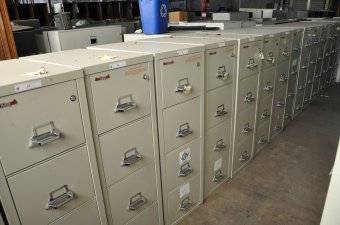
Fireproof filing cabinets might cost more than standard cabinets, but you'll be getting first-rate protection from unexpected disasters.
Whether you're running a business or just safeguarding personal documents, investing in a fireproof filing cabinets can save you a lot of headaches in the event disaster strikes.
If your method of caring for your vital records involves a flimsy, three-ring binder or a shoebox in your closet, it might be time to re-evaluate.
Paper starts burning at 400 degrees?Fahrenheit? but structure fires burn at much, much higher temperatures. Unlike a regular wooden, metal filing cabinet or that three-ring binder, a UL-tested fireproof cabinet is designed such that internal temperatures won't exceed 350 degrees?Fahrenheit?for the amount of time specified by the manufacturer. This means when a fire strikes your home or business, your documents should be protected long enough for emergency workers to put out the fire.
Think you don't have enough paper records to justify purchasing a costly fireproof cabinet? Think again. Businesses and individuals both amass a fair amount of paperwork that can be difficult, if not impossible, to replace if destroyed.
Here are the items that must be stored in a fireproof filing cabinet.
Business:
1. Contracts and agreements that prove ownership of property, equipment, vehicles, products, etc.
2. Grants and leases
3. Operational records including current accounting and tax records, current personnel payroll, leave and insurance records, budget records, account histories and shipping records
4. Current client files
5. Current standard operating procedures (SOPs)
6. Produced reports and summaries
7. Software source codes
8. Emergency operating records (any documents that dictate planning, organization and company hierarchy in the event of a disaster)
9. Founding documents
Home:
10. Property insurance and contact information for your agent
11. Any paperwork related to end-of-life planning; these include wills, living wills, powers of attorney and health-care proxies
12. Copies of any wills for which you are the designated executor
13. Passports, birth certificates, death certificates, marriage licenses and social security cards (originals)
14. Lists of family doctors, prescription medication and contact information for health care providers and pharmacies
15. Paperwork related to investments, bank accounts and retirement plans
16. Vehicle titles and spare keys
17. Warranties
18. Stocks and bonds
19. Certificates of deposit
20. Electronic files like photos, videos, storage drives, etc.
Source: CBS MoneyWatch, SafetyFile.com and Marquette University
Safeguarding your most valuable records within a fireproof fortress costs a bit more than buying a standard filing cabinet. Luckily, you can find used, name brand cabinets at Arnolds for a fraction of the cost of buying new. Start shopping now.





